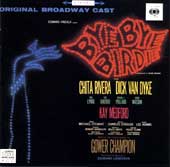 BYE BYE BIRDIE
BYE BYE BIRDIE
Book by Mike Stewart Lyrics by Lee Adams; Music by Charles Strouse
Martin Beck Theatre, Broadway 14 April, 1960 (607 perfs)
Her Majesty's Theatre, London - 15 June, 1961
Synopsis
THAT this American musical should centre upon an English " pop " singer of the Beatle type when his original was already to hand in the shape of Elvis Presley, is evidence of how wide a currency our version of this class of entertainer obtains nowadays.
Although he has an important role, the magnetic Conrad Birdie is not the hero of the play, but rather his manager Albert Peterson, aided by the latter's secretary Rose Alvarez. She urges Albert to abandon this mode of existence and fulfil his academic calling, but he must first find fifty thousand dollars compensation for Conrad and the 3 Birdies upon termination of contract due to their having been conscripted into the American Armed Forces.
Rose soon has a plan to realise this sum. Albert is to compose a " hit " tune, One Last Kiss, for the televising on The Ed Sullivan Show of a personal farewell to Conrad by the Secretary of the Birdie Fan Club, Kim Macafee, who lives in Sweet Apple, Ohio. News of the call-up so upsets one young fan that Albert feels obliged to restore her spirits in Put On a Happy Face. The Birdies' reception by the local worthies is the occasion for Conrad's " pop " philosophical Honestly Sincere, which provokes the usual screams and faintings (not always confined to the teenage generation).
When Albert's Mother (non-singing) mischievously introduces the vampish Gloria (non-singing) to Albert, Rose responds by getting Kim's " steady," Hugo Peabody (non-singing), to wreck the television show by settling his differences with Conrad in front of the cameras.
Later, Kim joins Rose in singing What Did I Ever See In Him? then informs her parents she has A Lot of Living to Do with Conrad. The severely strained relationships are highlighted by the dissension between the younger and older generations as Mr. and Mrs. Macafee sing Kids. Kim's and Conrad's example is followed by others, among whom Rose, firstly in Spanish Style, then near-Turkish, dances her way into a private meeting of Sweet Apple Rotarians. Albert gets her back only by at last putting an end to his mother's interference. When Conrad sees how his supposed view of life is misconstrued by Kim he is glad to drop the pose. He regards his call-up as a redemption and relieves Albert of his contractual obligations.
All singing roles require voices of middle range except Rose who should be an incisive contralto. The chorus of teenagers and parents in Sweet Apple should include a few true sopranos and tenors, and at least one tenor is necessary for the male quartet of dish-washers who accompany Albert's pleading with Rose in Baby Talk To Me.
(It is supposed that Societies will prefer the alternative Overture and Entr'acte which dispense with cinematic projection. The orchestration caters only for the alternatives.)
Instrumentation:
Flute, 1st Alto Saxophone/1st Clarinet; 2nd Alto Saxophone/2nd Clarinet and Baritone Saxophone (Opt.); Bb Tenor Saxophone/3rd Clarinet and Bass Clarinet (Opt.). 1st, 2nd and 3rd Bb Trumpets; 1st and 2nd Trombones; Percussion; Piano; Strings.
Musical Numbers
Baby, Talk To Me
An English Teacher
A Healthy, Normal American Boy
Honestly Sincere
How Lovely To Be a Woman
Hymn For A Sunday Evening
Kids
A Lot Of Livin' To Do
One Boy (One Girl)
One Last Kiss
Put On A Happy Face
Spanish Rose
The Telephone Hour
We Love You Conrad
What Did You Ever See In Him?
Discography
OBC - Columbia CD CK 2025
F.S. - RCA 1081-2-R
Libretto
